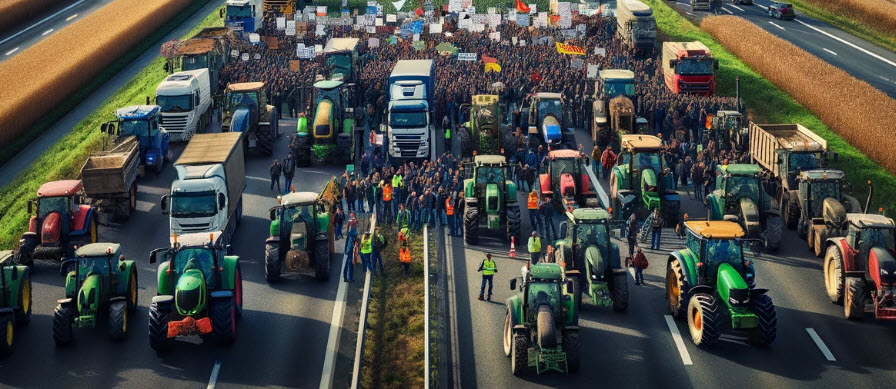In a wave of protests, farmers across France and various parts of Europe are taking a stand, with their grievances echoing through the blocked highways leading to Paris and beyond. As tractors become symbols of resistance and agricultural distress spills onto the streets, a closer examination reveals a complex tapestry of issues fueling the discontent.
The Heart of the Matter: Why Are Farmers Protesting?
At the core of the protests is a cry for survival from the heartland of Europe’s agricultural sector. French farmers, representing the EU’s leading agricultural force, find themselves ensnared in a vise of financial pressures and regulatory burdens. Their protests articulate a broader narrative shared by their European counterparts, highlighting a struggle against diminishing returns, environmental mandates, and the specter of international competition.
Economic Pressures: A Tightening Noose
The financial landscape for these farmers is increasingly precarious. Government and retail efforts to mitigate food inflation are inadvertently pushing many producers to the brink, unable to shoulder the escalating costs of energy, fertilizers, and transport. A notable flashpoint in this economic fray is the planned phase-out of a diesel fuel tax break, a move that has ignited widespread frustration within the agricultural community.
The Import Conundrum: Unfair Competition
Adding fuel to the fire, the influx of imports from Ukraine, facilitated by the EU’s waiver of quotas and duties post-Russia’s invasion, alongside the looming EU-Mercosur trade deal, has stirred fears of unfair competition. European farmers are particularly aggrieved by the double standard, where imported products, notably in the sugar, grain, and meat sectors, undercut local prices without adhering to the stringent environmental standards imposed on EU producers.
Regulatory Burdens: The Stranglehold of Red Tape
Environmental regulations and the perceived overzealous implementation of EU policies are a significant source of angst. Upcoming subsidy rules requiring farmland to lie fallow, coupled with France’s intricate policy enforcement, exemplify the bureaucratic hurdles farmers face. These green mandates, often seen as at odds with the goal of enhancing self-sufficiency in food production, have exacerbated the sense of alienation among France’s ageing farmer demographic.
Government Response: A Balancing Act
In a bid to quell the unrest, the French government, led by Prime Minister Gabriel Attal, has made conciliatory gestures, including the repeal of the diesel tax hike and promises to cut through the bureaucratic maze. Additional aid and support measures are on the table, particularly for sectors hit hardest by external challenges, such as wine production and livestock farming. Yet, the reaction from the farming community has been mixed, with calls for continued protests signaling a deep-seated dissatisfaction.
Looking Ahead: The Road to Resolution
The unfolding scenario underscores a pivotal moment for European agriculture, with the French government’s overtures representing only the initial steps toward addressing a multifaceted crisis. The broader EU framework, within which most agricultural policies and subsidies are determined, remains a critical arena for securing meaningful concessions and reforms. As France seeks to rally support for its agricultural agenda at the EU level, the outcome of these efforts will be closely watched, with implications that extend far beyond the fields of France.
A Continental Concern: Solidarity in Struggle
The unrest in France is not an isolated phenomenon. From the congested streets of Brussels to the protests in Germany and Romania, the agricultural turmoil reflects a shared struggle across the continent. As farmers in Belgium disrupt traffic and German farmers rally against similar economic pressures, the collective actions underscore a widespread call for recognition, reform, and a sustainable path forward for Europe’s agricultural heartlands.
In this moment of upheaval, the resilience of Europe’s farmers is a testament to the critical role they play in the fabric of society. As they seek to navigate the challenges of modern agriculture, their protests serve as a stark reminder of the need for a balanced approach that honors both the environmental stewardship and the economic viability essential to the future of farming in Europe.
Stay up to date on other relevant news in our “News and Politics” section.





